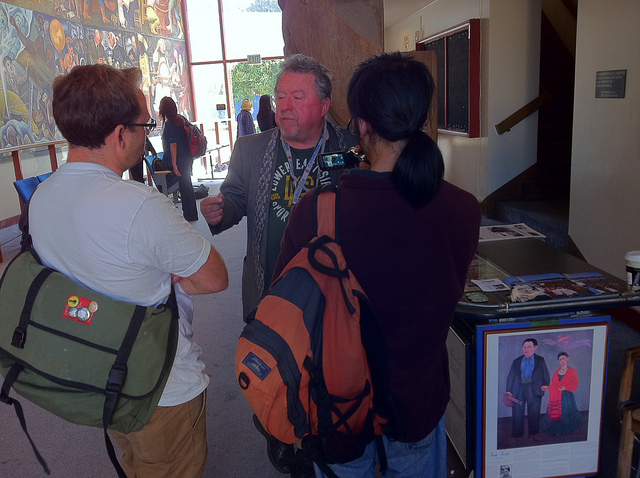BROOKS: How did the Night Cabbie come about?
LAWRENCE: I was flat broke, so I started driving a cab at night. After a few weeks I was running into so many different kinds of people. I sent letters to the Chronicle and Examiner, and Phil Bronstein from the Examiner responded. He called me and said if you can write a column like you wrote this letter, I think we can do something.
I did it for about a month and a half, then an editor from the Examiner called me in and said, "We need dialogue." So I put it in, and the pageviews started going up. I started getting emails from around the world.
BROOKS: Did anyone know who you were except Bronstein?
LAWRENCE: Only a handful of people knew. Phil and Herb Caen’s secretary knew. But I never came into the office.
BROOKS: How did you develop your writing style?
LAWRENCE: I’m real big on noir films. I didn’t want it to be a happy-go-lucky type column, I wanted it to be something a little philosophical, with also this cab driver who can’t pay his f**** bills. You’re barely getting by every month, you’re paying these sharks around you just to stay afloat. At the same time, I’m thinking how did Edgar Allan Poe become famous? He drank wine when he wrote his stories. So I’d finish off half a bottle of when I was writing. I had a Swedish typewriter, it didn’t have correctable on it. By the time I got it to Phil Bronstein, there were five pages of crossed out words, then the story. I looked over some noir books, I looked at Hemingway. I pulled out the big words even when people said them in conversation.
BROOKS: Were the columns edited?
LAWRENCE: The last five years, I refused to let the paper edit them. If you were a copyeditor at the Chronicle or the Examiner, you'd want to put your own stamp on it, and I’d have to call you up and rake you over the coals, because you’re not the writer.
BROOKS: How much were you paid?
LAWRENCE: I got $250 per column, and there were usually two per month. But between that and what I was making as a taxi driver, I still couldn’t make the rent. And I’m driving seven days a week; I’m driving like a zombie. During the bad economy in 2004, no one was making any money, guys were quitting left and right, turnover was phenomenal. So I quit driving altogether and got a job at HUD. I started driving again in 2006, and got my medallion in 2010.
BROOKS: Do you have any material you didn't publish?
LAWRENCE: I wrote about 2,000 stories, they published maybe 400-450. A lot of the unpublished stories were more gritty. I have them in cartons.
BROOKS: Any plans to publish those?
LAWRENCE: I haven't determined what I'm going to do with them. But the conversations aren't dated.
BROOKS: Ever pick up anyone famous?
LAWRENCE: I picked up Milton Friedman in front of a pizza place at Columbus and Green. We started talking, so I threw in the state of the economy, questions on supply and demand. He was looking out the window, and I say, "there’s a lot of guys in this town that write these economic treatises that are published across the world, and they design those treatises based on the economics of North Beach. It's probably the same, it's just a microcosm. He goes out to the doorman, looks at me one more time, then comes back and tips me another dollar or two. He only left me 80 cents the first time.
BROOKS: Any particular encounter in your cab that stands out in your mind?
LAWRENCE: I picked up a young woman who said can I tell you something about my life? My best friend is a paraplegic. I helped her out Saturday when she couldn’t get her nurse. I did everything for her that you can imagine a human being would do for somebody who can’t help themselves. She said now I thank god for what I have. I dropped her off, and she said thank you very much, because I needed someone to talk to about that. I took that really emotionally. Jesus, I’m just a taxi driver, I’m not a psychoanalyst or anything. Why did she pick me?
BROOKS: What's the deal with your running for mayor?
LAWRENCE: I ran for mayor not to be mayor, but to learn the whole procedure about how someone runs for office. I didn’t have political machine, I didn’t have any money. All I had was enough to pay the $5,000 fee. I plan to run for District 2 supervisor in the next election.
